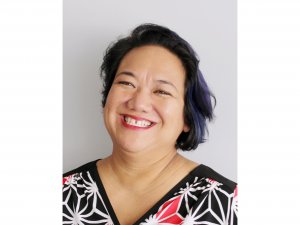Presented By: Department of American Culture
AC Lecture: The Kingdom and the Republic: Decolonizing Native History Governance, Power and Law in 1820s Hawaiʻi
Noelani Arista (Associate Professor, University of Hawaiʻi at Mānoa)

Public Lecture
Title: “The Kingdom and the Republic: Decolonizing Native History Governance, Power and Law in 1820s Hawaiʻi”
Friday, November 30, 2018
1:30-3:00PM
Hatcher Graduate Library, Gallery
Refreshments provided
Dr. Noelani Aristaʻs talk focuses on the epistemology and praxis of research in indigenous archives, whether conditioned by the colonial state or digital technologies. She will discuss her work in and translation of Hawaiian language source materials, which emerge from the largest indigenous-language archive in the Pacific and quite possibly Native North America. She will also speak about its implications for research methods more broadly in the humanities and digital humanities.
Bio:
Noelani Arista is a historian of Hawai‘i and the US who engages Hawaiian language archival materials as they cast light on Hawaiian governance and law, Hawaiian intellectual history, colonialism, and missionization. She is the winner of the Society of American Historians Allan Nevins Prize. Her book, The Kingdom and the Republic: Sovereign Hawai‘i and the Early United States will be inn print this month with University of Pennsylvania Press. Arista is the developer of “365 days of aloha,” a public online project the focuses on understanding the concept of “aloha” through mele (Hawaiian songs). She is also a developer of Indigenous digital games and a member of the Initiative for Indigenous Futures.
Digital Workshop
Title: “Seeking into the Indigenous Future: The Transmediation of Mo‘olelo: How Digital Mediums Challenge Deep Knowing”
Friday, November 30
10:00-11:30
Shapiro Design Lab
The transmediation of moʻolelo from textual archives into digital formats is necessary for survivance of indigenous knowledge. This presentation will highlight the challenges of persistance and creating new ʻike (knowledge) by examining approaches to research in digital databases, organizing our own digital Hawaiian language and translation archives, and investigating video games and mobile applications that we can use to add to the moʻo (succession) of moʻolelo (history and story).
Title: “The Kingdom and the Republic: Decolonizing Native History Governance, Power and Law in 1820s Hawaiʻi”
Friday, November 30, 2018
1:30-3:00PM
Hatcher Graduate Library, Gallery
Refreshments provided
Dr. Noelani Aristaʻs talk focuses on the epistemology and praxis of research in indigenous archives, whether conditioned by the colonial state or digital technologies. She will discuss her work in and translation of Hawaiian language source materials, which emerge from the largest indigenous-language archive in the Pacific and quite possibly Native North America. She will also speak about its implications for research methods more broadly in the humanities and digital humanities.
Bio:
Noelani Arista is a historian of Hawai‘i and the US who engages Hawaiian language archival materials as they cast light on Hawaiian governance and law, Hawaiian intellectual history, colonialism, and missionization. She is the winner of the Society of American Historians Allan Nevins Prize. Her book, The Kingdom and the Republic: Sovereign Hawai‘i and the Early United States will be inn print this month with University of Pennsylvania Press. Arista is the developer of “365 days of aloha,” a public online project the focuses on understanding the concept of “aloha” through mele (Hawaiian songs). She is also a developer of Indigenous digital games and a member of the Initiative for Indigenous Futures.
Digital Workshop
Title: “Seeking into the Indigenous Future: The Transmediation of Mo‘olelo: How Digital Mediums Challenge Deep Knowing”
Friday, November 30
10:00-11:30
Shapiro Design Lab
The transmediation of moʻolelo from textual archives into digital formats is necessary for survivance of indigenous knowledge. This presentation will highlight the challenges of persistance and creating new ʻike (knowledge) by examining approaches to research in digital databases, organizing our own digital Hawaiian language and translation archives, and investigating video games and mobile applications that we can use to add to the moʻo (succession) of moʻolelo (history and story).